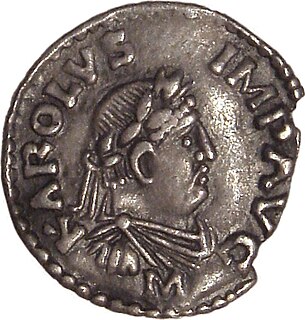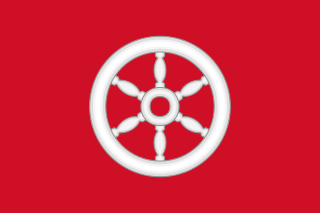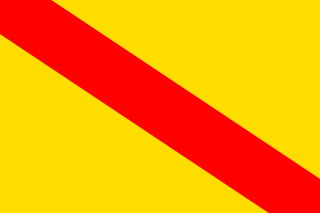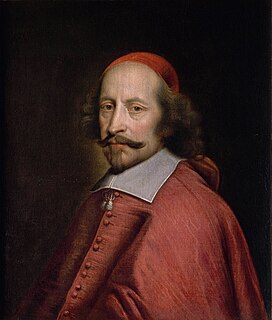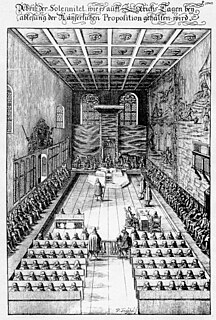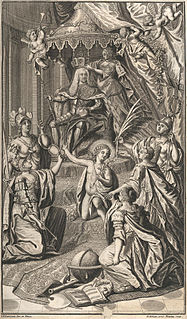
Leopold II was Holy Roman Emperor, King of Hungary, and Bohemia from 1790 to 1792, and Archduke of Austria and Grand Duke of Tuscany from 1765 to 1790. He was the earliest opponent of capital punishment in modern history. He was a son of Emperor Francis I and his wife, Empress Maria Theresa, and the brother of Marie Antoinette, Queen of France, Maria Carolina of Austria and Joseph II, Holy Roman Emperor. Leopold was a moderate proponent of enlightened absolutism. He granted the Academy of Georgofili his protection. Despite his brief reign, he is highly regarded. The historian Paul W. Schroeder called him "one of the most shrewd and sensible monarchs ever to wear a crown".
French Revolution
Following the Seven Years' War and its support of the United States in the American Revolutionary War, the French government was deeply in debt. Its main source of income was a burdensome tax on its peasants which could not be much increased. As 1789 dawned, after years of bad harvests, it stood at the brink of a financial and social crisis.

The Seven Years' War was a global conflict fought between 1756 and 1763. It involved every European great power of the time and spanned five continents, affecting Europe, the Americas, West Africa, South Asia, and the Philippines. The conflict split Europe into two coalitions: one was led by the Kingdom of Great Britain and included the Kingdom of Prussia, the Kingdom of Portugal, the Electorate of Brunswick-Lüneburg, and other small German states; while the other was led by the Kingdom of France and included the Austrian-led Holy Roman Empire, the Russian Empire, the Kingdom of Spain, and the Swedish Empire. Meanwhile, in India, some regional polities within the increasingly fragmented Mughal Empire, with the support of the French, tried to crush a British attempt to conquer Bengal.

The United States of America (USA), commonly known as the United States or America, is a country comprising 50 states, a federal district, five major self-governing territories, and various possessions. At 3.8 million square miles, the United States is the world's third or fourth largest country by total area and is slightly smaller than the entire continent of Europe's 3.9 million square miles. With a population of more than 327 million people, the U.S. is the third most populous country. The capital is Washington, D.C., and the most populous city is New York City. Forty-eight states and the capital's federal district are contiguous in North America between Canada and Mexico. The State of Alaska is in the northwest corner of North America, bordered by Canada to the east and across the Bering Strait from Russia to the west. The State of Hawaii is an archipelago in the mid-Pacific Ocean. The U.S. territories are scattered about the Pacific Ocean and the Caribbean Sea, stretching across nine official time zones. The extremely diverse geography, climate, and wildlife of the United States make it one of the world's 17 megadiverse countries.

The American Revolutionary War (1775–1783), also known as the American War of Independence, was an 18th-century war between Great Britain and its Thirteen Colonies which declared independence as the United States of America.
In order to resolve the crisis, the king, Louis XVI of France, called the Estates General of 1789 on January 24. The Estates General quickly became mired in disputes over the representation of the various estates. On June 17, after months of such disputes, the Third Estate, representing the common people, declared itself the National Assembly. On June 20, the National Assembly swore not to disperse until they had established a constitution.
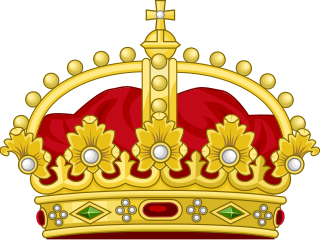
King, or king regnant, is the title given to a male monarch in a variety of contexts. The female equivalent is queen regnant, while the title of queen on its own usually refers to the consort of a king.

Louis XVI, born Louis-Auguste, was the last King of France before the fall of the monarchy during the French Revolution. He was referred to as citizen Louis Capet during the four months before he was guillotined. In 1765, at the death of his father, Louis, son and heir apparent of Louis XV, Louis-Auguste became the new Dauphin of France. Upon his grandfather's death on 10 May 1774, he assumed the title "King of France and Navarre", which he used until 4 September 1791, when he received the title of "King of the French" until the monarchy was abolished on 21 September 1792.

The Estates General of 1789 was a general assembly representing the French estates of the realm: the clergy, the nobility, and the commoners, the last of Estates General of Kingdom of France. Summoned by King Louis XVI, it was brought to an end when the Third Estate formed into a National Assembly, inviting the other two to join, against the wishes of the King. This signaled the outbreak of the French Revolution.
The dismissal of the Controller-General of Finances Jacques Necker, seen as sympathetic to the Third Estate, and the gathering of the army outside Paris led to fears that the National Assembly and its supporters among the people were soon to be crushed. In response, a bourgeois militia, the National Guard, was spontaneously established on July 13. On July 14, the National Guard stormed the Bastille, a prison and armory, and killed its defenders. On July 15, the army outside Paris withdrew to its garrisons. The capital would never return to effective royal control. During the night of June 20, 1791, the king and his wife, Leopold's sister Marie Antoinette, fled Paris in an attempt to meet counterrevolutionary troops at Montmédy. They were recognized and arrested on June 21 at Varennes-en-Argonne.
The Controller-General or Comptroller-General of Finances was the name of the minister in charge of finances in France from 1661 to 1791. The position replaced the former position of Superintendent of Finances, which was abolished with the downfall of Nicolas Fouquet.

Jacques Necker was a banker of Genevan origin who became a finance minister for Louis XVI and a French statesman. Necker played a key role in French history before and during the first period of the French Revolution.

Paris is the capital and most populous city of France, with an area of 105 square kilometres and an official estimated population of 2,140,526 residents as of 1 January 2019. Since the 17th century, Paris has been one of Europe's major centres of finance, diplomacy, commerce, fashion, science, as well as the arts. The City of Paris is the centre and seat of government of the Île-de-France, or Paris Region, which has an estimated official 2019 population of 12,213,364, or about 18 percent of the population of France. The Paris Region had a GDP of €709 billion in 2017. According to the Economist Intelligence Unit Worldwide Cost of Living Survey in 2018, Paris was the second most expensive city in the world, after Singapore, and ahead of Zurich, Hong Kong, Oslo and Geneva. Another source ranked Paris as most expensive, on a par with Singapore and Hong Kong, in 2018. The city is a major railway, highway, and air-transport hub served by two international airports: Paris-Charles de Gaulle and Paris-Orly. Opened in 1900, the city's subway system, the Paris Métro, serves 5.23 million passengers daily, and is the second busiest metro system in Europe after Moscow Metro. Gare du Nord is the 24th busiest railway station in the world, but the first located outside Japan, with 262 million passengers in 2015.
On August 27, Leopold and Frederick William II of Prussia, king of Prussia, issued the Declaration of Pillnitz, calling for the release of Louis and Marie Antoinette and promising that, if his safety was threatened, and with the support of the other monarchs of Europe, they would go to war to restore him. The National Assembly interpreted the declaration as a declaration of war against the revolutionary government. On April 20, 1792, it declared war on Leopold's son Francis, his successor as king of Hungary, Croatia, and Bohemia.

Frederick William II was King of Prussia from 1786 until his death. He was in personal union the Prince-elector of Brandenburg and sovereign prince of the Canton of Neuchâtel. Pleasure-loving and indolent, he is seen as the antithesis to his predecessor, Frederick II. Under his reign, Prussia was weakened internally and externally, and he failed to deal adequately with the challenges to the existing order posed by the French Revolution. His religious policies were directed against the Enlightenment and aimed at restoring a traditional Protestantism. However, he was a patron of the arts and responsible for the construction of some notable buildings, among them the Brandenburg Gate in Berlin.
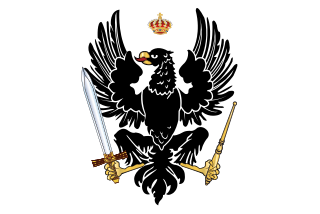
The Kingdom of Prussia was a German kingdom that constituted the state of Prussia between 1701 and 1918. It was the driving force behind the unification of Germany in 1871 and was the leading state of the German Empire until its dissolution in 1918. Although it took its name from the region called Prussia, it was based in the Margraviate of Brandenburg, where its capital was Berlin.
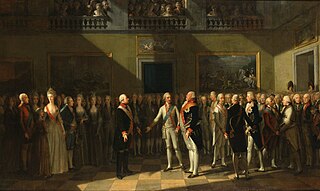
The Declaration of Pilnite, more commonly referred to as the Declaration of Pillnitz, was a statement issued on 27 August 1791 at Pillnitz Castle near Dresden (Saxony) by Frederick William II of Prussia and the Habsburg Holy Roman Emperor Leopold II who was Marie Antoinette's brother. It declared the joint support of the Holy Roman Empire and of Prussia for King Louis XVI of France against the French Revolution.

